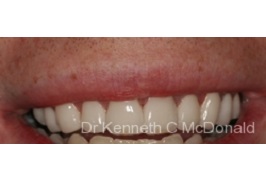Dental Crowns
Restore Your Tooth's Natural Look & Feel

Used to cover and protect a tooth or restore its shape, dental crowns are caps placed on the tops of damaged teeth. Crowns make for an ideal solution when dental fillings cannot solve a problem and are typically made from metal alloys, porcelain, resin and ceramics.
Please contact us to discuss having crowns fitted or book in a consultation; we can help you achieve the most natural-looking teeth and pleasing results.
What are dental crowns?
Damage to your teeth occurs over time, for reasons varying from tooth decay, accidental injuries or everyday wear and tear. This damage can also cause a tooth to lose its natural shape or size, which is where dental crowns can help.
Acting as caps, made to resemble the look of your natural teeth, dental crowns are fixed in place and can restore a tooth’s shape, size, strength and appearance.

Why would I need a dental crown?
There are several reasons a dental crown may be needed or be recommended by one of our dentists, including:
- To protect a weak tooth
- To prevent any further damage or decay to your tooth and the surrounding teeth
- To restore a broken or worn down tooth
- To cover and support the visible portion of a damaged tooth
- To hold a dental bridge in place
- To cover misshapen or discoloured teeth
- To cover dental implants
- To cover a tooth that has been recently treated with a root canal treatment.
What are dental crowns made of?
Permanent dental crowns can be made out of many different materials. These materials can include:
- Metal (including gold, palladium, nickel and chromium)
- Porcelain-fused-to-metal
- All-resin
- All-ceramic
- All-porcelain.
Allander dental will typically suggest all-ceramic crowns for our patients, as they come with many benefits, including:
- Natural-looking teeth
- Protection of weakened teeth
- Improved cosmetic appearance
- Can reduce the risk of decayed or heavily restored teeth breaking
How do dental crown treatments work?
How will my tooth be prepared for a dental crown procedure?
Typically, you will visit us twice for a crown fitting.
The first visit
The first visit is when our dentist will get a good look at the tooth, complete a full examination, and prepare the tooth for the fitting. This may include taking x-rays of the area and any procedures that may be necessary before the crown can be fitting, such as a root canal, if there is any:
- Tooth decay
- Risk of infection
- Injury to the tooth’s pulp (the soft tissue inside your teeth which contains blood vessels, nerves and connective tissue).
Before a crown is fixed, the tooth may need to be filed down across its top and sides to make room for the crown. After the natural tooth is reshaped, a paste or putty will be used to make an impression of the tooth that’s going to receive the crown, ensuring a good fit and that there will be no effect on your natural bite.
These impressions are then used to make the crown itself with may take a couple of weeks. While this is happening, however, our dentist will place a temporary crown to protect your tooth until the permanent crown can be permanently cemented.
The second visit
During your second visit, the permanent crown will be placed on your tooth, and everything checked to ensure a good fit and a natural look across all of your front teeth.
How long do dental crowns last?
Typically a crowned tooth will stay healthy and not need any more crown work for between five and 15 years. However, this life span depends on the amount to wear and tear it is exposed to and how well you look after your oral health and hygiene.
How much do dental crowns cost?
The costs of a dental crown can vary depending on the type of crown that is used. For example, porcelain crowns will cost more than gold crowns, which are more expensive than porcelain-fused-to-metal crowns.
To learn more about which crown would be best for your case, contact Allander Dental Care to request a callback or learn more about this type of dental treatment.
Posterior Crown
Post Crown
Bridges
Fractured Cusp
Anterior Crown
Crown Margin
Crown Options



